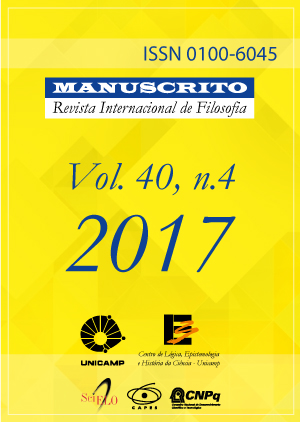Resumo
First, I consider a few motivations to idealize epistemic logics1 in such a degree that brings up the problem of logical omniscience [LOP]. I argue that the main motivation to hold omniscience is of a philosophical-scientific2 background (Stalnaker 1991), in the sense philosophers have a not so peculiar way of investigating underlying mechanisms, i.e., the interaction of several different components of complex systems may be better understood in isolation, even if such components are not found isolated in a realistic context. It is defended that the implicit and explicit knowledge distinction (Fagin and Halpern 1988) is compatible that view since idealizations made by modal epistemic logic are so strong that the agents they describe hardly have anything in common with real agents. I conclude by showing how LOP can be accommodated in the logic of being informed (Floridi 2006) using the Inverse Relationship Principle (Barwise and Seligman 1997).Referências
ALLO, P. “The Logic of ‘Being Informed’ revisited and revised”, Philosophical Studies, 2011.
ANAND, V. “The Epistemology of Modality”, The Stanford Encyclopedia of Philosophy (Winter Edition), Edward N. Zalta (ed.), URL = https://plato.stanford.edu/archives/win2016/entries/modality-epistemology/
ARISTOTLE, On Rhetoric, newly translated by George A. Kennedy, Oxford University Press, New York, 1991.
BAGGINI, L. e FOSL, P.S. The Philosophers Toolkit – A Compendium of Philosophical Concepts and Methods. Wiley-Blackwell, USA, 2010.
BAR-HILLEL, Y. e CARNAP, R. “An Outline of a Theory of Semantic Information”, repr. in Bar-Hillel [1964], 221-74, 1953.
BARWISE, J. and SELIGMAN, J. Information Flow: The Logic of Distributed Systems, Cambridge: Cambridge University Press, 1997.
CHALMERS, D. J. The Conscious Mind: In Search of a Fundamental Theory. Nova Iorque, Oxford University Press, 1996.
CHOMSKY, NOAM. Aspects of the Theory of Syntax. Cambridge, MA: MIT Press, 1965.
DENNETT, D. The Intentional Stance. MIT Press, 1985.
DENNETT, D. “Can Machines Think?” in: Brainchildren: Essays on Designing Minds, 1998. MIT Press, Cambridge MA. 3-20.
FAGIN R., Halpern J. Y, Moses Y. e Vardi M. Y. Reasoning about knowledge, MIT Press, Cambridge, Mass, 1995.
FLORIDI, L. "Outline of a Theory of Strongly Semantic Information". Minds and Machines 14: 197, Springer, 2004.
FLORIDI, L. “The Logic of Being Informed”. Logique et Analyse, 49, pp. 433-460, 2006.
FLORIDI, L. “Semantic Information and the Correctness Theory of Truth”, Erkenntnis, 74 (2), 147-175, 2010.
FLORIDI, L. “A Plea for Non-naturalism as Constructionism”. Minds and Machines, 27(2), 269-285, Springer, 2017.
HENDRICKS, V. F. Mainstream and Formal Epistemology, Cambridge University Press.
HINTIKKA, J. (1962), Knowledge and Belief, Cornell University Press, 2006.
HINTIKKA, J. “A second generation epistemic logic and its general significance”, in V. F. Hendricks, S. A. Pedersen, and K. F. Jørgensen (eds.), Knowledge Contributors, number 322 in Synthese Library. Kluwer Academic, Dordrecht, 2003.
HUANG, Z.S. and K. KWAST. “Awareness, negation and logical omniscience”, in J. van Eijck (Ed.), Logics in AI, volume 478 of Lectures Notes in Computer Science, pages 282-300, Springer, 1991.
LEMMON, E. J. “Review: K. Jaakko, J. Hintikka, Quantifiers in Deontic Logic.” J. Symbolic Logic 24, no. 2, 178—179, 1959.
LEVESQUE, H. J. “A logic of implicit and explicit belief”, in: Proceedings AAAI- 84 Austin, TX, 198-202, 1984.
JAGO, M. “Hintikka and Creswell on Logical Omniscience”, Logic and Logical Philosophy, 15(1), 325-354, 2006.
KRIPKE, S. Naming and Necessity. Oxford, Blackwell, 1980.
PUTNAM, H. “The Meaning of ‘Meaning’”. Language, Mind and Knowledge, Minnesota Studies in the Philosophy of Science, VII, Minneapolis: University of Minnesota Press, 1975.
QUINE, W. V. Theories and Things. Cambridge, Mass.; London: Belknap Press of Harvard University Press, 1981.
SEARLE, J. R. “Is the Brain a Digital Computer?” Proceedings and Addresses of the American Philosophical Association, 64, 21-37, 1990.
STALNAKER, R. “The Problem of Logical Omniscience”, in: Synthese, 89(3), Belief and Rationality, 425-440, Springer, 1991.
STALNAKER, R. Our Knowledge of the Internal World, Nova Iorque, Oxford University Press, 2008.
VAN BENTHEM, J. Logical dynamics of information and interaction. Cambridge, Cambridge University Press, 2010.
VELÁZQUEZ-QUESADA, F. R. e VAN BENTHEM, J. “The dynamics of awareness”. Synthese, 177 (1), 5-27, 2010.
WITTGENSTEIN, L. Tractatus Logico-Philosophicus. Trad., notas e ensaio introdutório de Luiz Henrique L. Santos. 2. ed. São Paulo: Edusp, 1994.

